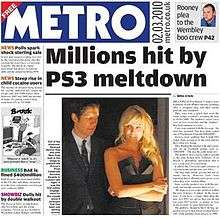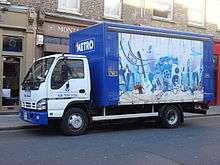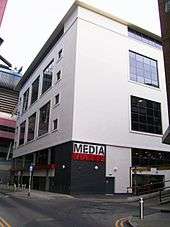Metro (British newspaper)
 Cover on 2 March 2010 | |
| Type | Freesheet |
|---|---|
| Format | Tabloid |
| Owner(s) | DMG Media |
| Editor | Ted Young |
| Founded | 16 March 1999 |
| Headquarters | Kensington, London, U.K. |
| Circulation | 1,477,000 |
| ISSN | 1469-6215 |
| OCLC number | 225917520 |
| Website |
www |
Metro is a free newspaper published in tabloid format in the United Kingdom by DMG Media (part of Daily Mail and General Trust). It is distributed from Monday to Friday (excluding bank holidays) on many public-transport services and stations in cities and towns across the United Kingdom. Distributors have also been employed to hand out copies to pedestrians.
History
The paper was launched in London on 16 March 1999,[1] and can now be found in most towns and cities across the UK. It is part of the same media group as the Daily Mail and The Mail on Sunday, although, in some areas, Metro operates as a franchise with a local newspaper publisher, rather than as a wholly owned concern.
The Metro concept comes from Sweden. Metro International, a different company, launched in the UK in 1999, and, in Newcastle upon Tyne, this company's paper was distributed on the Tyne and Wear Metro system side by side with the Metro of Associated Newspapers (now DMG Media). After battling alongside the Associated Newspapers' version with the same name, Metro International's Metro changed its name to Morning News. However, Morning News was short-lived, being discontinued shortly afterwards (see Metro International). Metro International have had plans to launch a rivalling free evening newspaper in London.[2]
Similarly, Rupert Murdoch is said to have regretted missing the opportunity of launching his own London paper. However, News International, a UK subsidiary of Murdoch's News Corporation, launched a London-based newspaper in 2006 called The London Paper, using funding from Liam McDonald.[3] This was closed on 18 September 2009.
Content
The newspaper is divided into three main sections - news, features and sport. The features section contains a mix of articles on travel, homes, style, and health, science, as well as extensive arts coverage and entertainment listings. The puzzles page currently features a crossword and Sudoku.
On 8 July 2009, the online version of Metro was merged with London Lite.[4]
As of 2015, production of Metro newspaper and the website Metro.co.uk was separated, so that they are now written independently by different editorial teams, but remain part of the same parent company.
Distribution

In its first five years, it achieved a readership of over 1 million daily readers, making it the UK's fourth largest daily newspaper, after The Sun, the Daily Mail, and the Daily Mirror. In October 2008, its total certified distribution for that month was 1,361,306. It now prints approximately 1.3m copies daily, and officially has some 3.5m readers, as of March 2010.[5] The WAN-IFRA reported its 2010 circulation as 1,335,000.[6]
In October 2016 circulation was increased to nearly 1.5 million.[7]
In the West Midlands, it is distributed on Network West Midlands buses.
Metro Herald (Ireland)
The Dublin freesheet Metro Herald was similar in layout and content to its British counterpart, as Associated Metro provides much of the content.[8] Metro Herald was formed by the merging of Metro Ireland with its main competitor, Herald AM (published by Independent News & Media's Evening Herald).
Metro Ireland was launched on 10 October 2005, as was Herald AM. Both titles were loss-making, despite a circulation of 145,000 between them in the Greater Dublin Area. The merger of the two titles faced scrutiny by the Competition Authority as the resulting match up drew together IN&M (publishers of the Irish Independent) and The Irish Times (the two Dublin-based broadsheets).[9] On 2 July 2009, it was announced that the two freesheets were to merge,[10] and by 2010 this merger was complete.[11] Publication ceased in December 2014.
GameCentral
GameCentral was founded on 10 March 2003 to replace Digitiser as the video game section of Channel 4's analogue Teletext service. Its contents page was originally found on page 690 of Channel 4 analogue Teletext, and on page 805 of digital Teletext (on both ITV and Channel 4). From May 2007, the service was also carried on the Teletext website. It was announced on 17 July 2009 that GameCentral would cease broadcast in December 2009, along with all other Teletext editorial content. However, on 13 October 2009 it was announced that GameCentral would continue as a website and mobile service.[12] GameCentral was subsequently relocated to the website of the Metro newspaper, also owned by Daily Mail and General Trust.[13]
References
- ↑ Luft, Oliver (16 March 2009). "Metro newspaper celebrates 10 years of publication". The Guardian. Retrieved 15 May 2015.
- ↑ Media Guardian, 3 April 2003 "Desmond in Swedish talks over London freesheet"
- ↑ Liam McDonald Funds Metro, Midworth Associated with Deal, Rory McFlanagan, Redditch Media Centre
- ↑ "London Lite — home of the best London news and celebrity gossip". Metro. 27 July 2009. Retrieved 22 January 2011.
- ↑ Home|dmg media
- ↑ Andra Leurdijk; Mijke Slot; Ottilie Nieuwenhuis (2012). "The Newspaper Publishing Industry" (Technical Report). EU Commission. Retrieved 6 October 2013.
- ↑ http://www.newsworks.org.uk/News-and-Opinion/metro-to-raise-circulation-by-10
- ↑ Cozens, Claire (10 October 2005). "Battle commences over Dublin freesheets". The Guardian. Retrieved 10 October 2005.
- ↑ Hancock, Ciarán (6 March 2009). "Rivals 'Herald AM' and 'Metro' in merger talks". The Irish Times. Retrieved 17 March 2009.
- ↑ Luft, Oliver (2 July 2009). "Rival Dublin freesheets Herald AM and Metro Ireland to merge". The Guardian. Retrieved 22 January 2011.
- ↑ Metro Herald
- ↑ "GameCentral Forever". GameCentral. Archived from the original on 16 October 2009. Retrieved 20 July 2010.
- ↑ "GameCentral is moving". GameCentral. 20 July 2010. Archived from the original on 13 June 2010. Retrieved 20 July 2010.
External links
- edition.metro Print e-edition and archive of Associated Newspapers' Metro newspaper
- metro.co.uk Metro Online website (owned by Associated Newspapers but separate from Metro print edition)
- Metro.mobi Mobile version of Associated Newspapers' Metro newspaper
- Hot off the Press, Steve Auckland, Metro MD discusses setting up the newspaper
- Metro Ireland
- e-Metro Ireland Digital version of Metro Ireland
